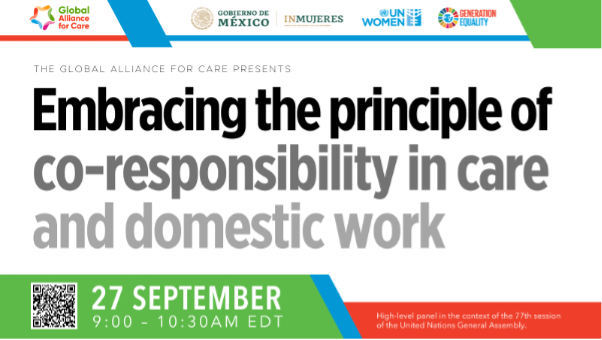On 27 September, at a high-level event on the occasion of the 77th Session of the United Nations General Assembly, the Global Alliance for Care promoted the co-responsibility of all sectors for the creation of comprehensive care systems that allow universal access to quality care to all who need it while protecting the labour rights of those who provide it.
The virtual event, entitled ‘Embracing the principle of Co-responsibility in Care and Domestic Work’, was convened by the Global Alliance for Care and co-organized by the National Institute of Women of Mexico (Inmujeres) and UN Women.

The Global Alliance for Care is a collective commitment from the Generation Equality Forum and its Action Coalition on Economic Justice and Rights. Convened by the Government of Mexico through Inmujeres and UN Women, it promotes the care economy as central to accelerate the pace towards achieving women's economic autonomy and a sustainable and transformative recovery from the COVID-19 pandemic.
“COVID has revealed the world's dependence on women as unpaid and primary caregivers. Women's work has proven essential. Yet, it remains largely unrecognized and unsupported, especially in times of crisis, with serious adverse effects on women's livelihoods and futures. Today's event is an opportunity to re-calibrate our global conversation on care”, said Ms. Sima Bahous, UN Women Executive Director.
Laura Pautassi, an academic at the University of Buenos Aires, Argentina, explained that “from a rights perspective, co-responsibility indicates care obligations for each interested party, including state, markets, social and community organizations, families and men within the household. This shared obligation is the result of years of feminist struggles that have argued that the naturalization of women's unique abilities to provide care underlies the naturalization of existing structural gender inequalities. Through this argument, feminists have seeded the debate on co-responsibility."
Highlighting that international human rights law provides comprehensive guidance, Director of Thematic Engagement, Special Procedures and Right to Development División for the OHCHR, Peggy Hicks, pointed out that “care is not an act of charity, but a matter of rights fulfilled. We must address the rights of women and girls both as caregivers and care users. It is also necessary to make a paradigm shift, from seeing care receivers as ‘dependents’ to recognizing them as rights-holders with a right to access quality support necessary for a life with dignity and autonomy.” She also emphasized the importance of ensuring participation of care givers and care users, in all their diversity, in decision-making.
“Comprehensive care systems recognize, redistribute and reduce the unpaid care work and accelerate the pace towards societies’ welfare, the creation of quality jobs and women’s greater labour participation, and the achievement of gender equality while also generating income for the State via taxes. This is the transformative power of the care economy,” said the Representative of UN Women Mexico, Belen Sanz.
Marita Perceval, Secretary of Equality and Diversity Policies of the Ministry of Women, Gender and Diversity of Argentina, highlighted that a standing feminist demand is to ensure tax reforms that land on a human rights-based fiscal pact that would tackle the persistent social and gender inequalities. In this respect, Ana Güezmes, Chief of the Division for Gender Affairs, ECLAC, emphasized that comprehensive care systems, built on the basis of co-responsibility, are a viable and proven alternative to move towards fiscal, social, environmental and cultural pacts that reverse gender inequalities and constitute a long-term solution to the crisis generated by the pandemic.
Speaking from the grassroots women’s civil society perspective, Chair of the Huairou Commission, Violet Shivutse, said “principles for co-responsibility must be rooted in placing the care economy at the center of the response and recovery to the COVID-19 crisis and seeing investments in it as a critical pathway for recognizing and rewarding the leadership grassroots women’s groups took in building an adaptive, people-centered local care infrastructure that kept their neighbors and own families alive and connected."
Akshat Singhal, co-founder of The Gender Lab, India, further advised “not to look at care in isolation but along with an understanding of masculinities and gender stereotypes while keeping the intersectional lens. It is critical to engage boys and men in community action, create safe spaces for them to not be shamed for holding care responsibilities, and understand the impact of patriarchy on their lives, families, and communities."
With regards to financing, Dorothy Gwajima, the Minister of Health, Community Development, Gender, Elders and Children of the Government of the United Republic of Tanzania highlighted that, in some countries, the pandemic has provided opportunities to mainstream gender-responsive financing as part of economic recovery strategies, aimed at bolstering affordable childcare, strengthening long-term care services as well as improving the working conditions and wages of care sector workers.
Ghada Abdel Tawab, Global Senior Program Officer for Future of Workers, Ford Foundation, stressed that the “scale and scope of care needs continue to challenge the philanthropic sector's capacity to secure scalable solutions. Global Public Investment should secure public funds to support the care economy as a ‘public good’ while private capital should align its capital with a just and sustainable economy including to invest in care.”
To this, Sharan Burrow, General Secretariat of ITUC, said that “the level of commitment that the Global Alliance for Care has generated is what we need to guarantee a transformative change for women and girls.” She added that investing in decent care jobs and valuing care work's contribution to society is critical to frame women in the broadened economy, build resilience, get society ready to cope with current and future socks, and ensure just transitions.
The interactive panel was moderated by Julieta Martínez, a global youth and climate activist from Chile, founder of the youth-led feminist organization Tremendas. She highlighted that “just as so many aspects of society are being rethought, care cannot be left behind.” We need high-scale, accountable commitments to ensure inclusive and sustainable societies for all if we are to achieve a feminist care agenda by 2026, she said.
Providing closing remarks, President of Inmujeres, Nadine Gasman Zylbermann, emphasized that “the care economy catalyzes economic recovery and the construction of a more egalitarian society. It is time to empasize the urgency of ensuring the sustainability of comprehensive care systems based on the co-responsibility of all actors.” She concluded by presenting a call to action on behalf the Global Alliance for Care, inviting the international community to declare 2023 a momentous year for the care economy to help galvanize and foster greater political will and ambition for multi-stakeholder action, investments and stronger accountability on care.
